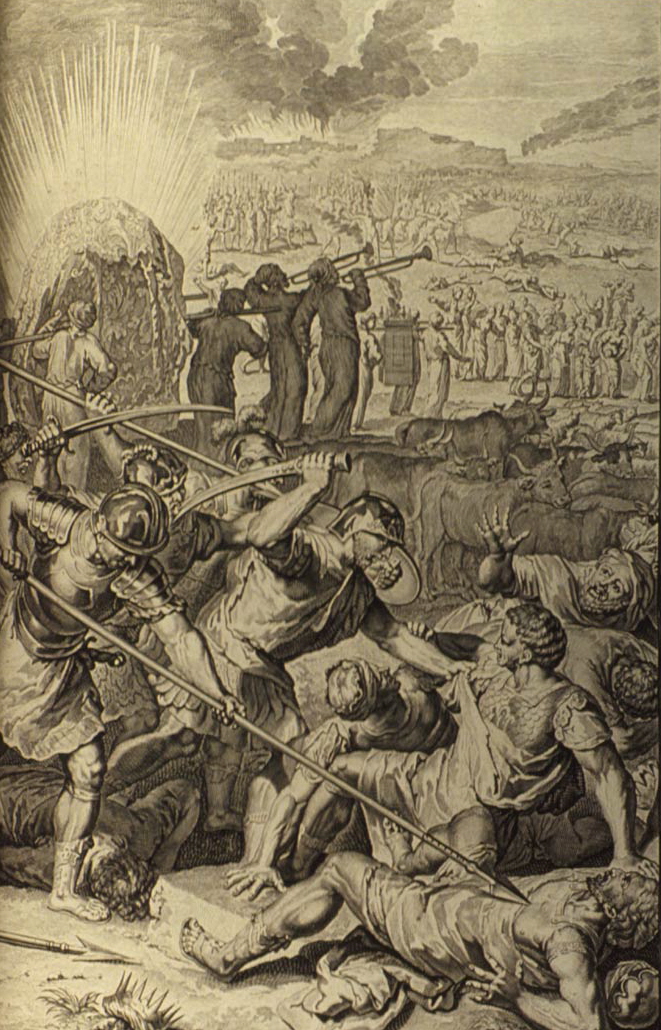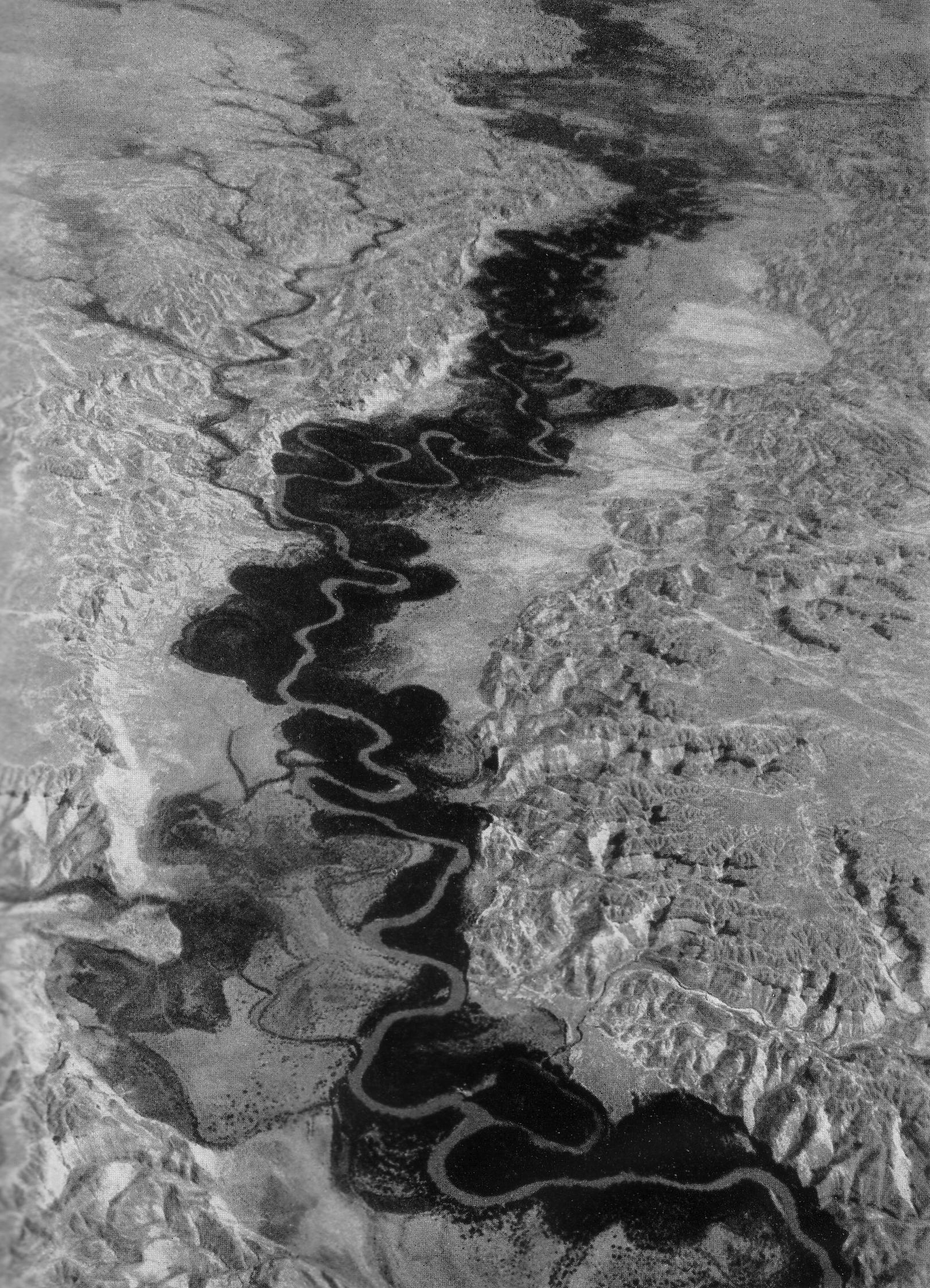|
Zebah And Zalmunna
Zebah ( ''ZeßĖćaßĖź'', "sacrifice", Zebee in the Brenton Septuagint Translation and the Douai-Rheims Bible) and Zalmunna (ū”ųĘū£ų░ū×ų╗ūĀųĖų╝ūó ''ß╣óalmunn─üŌĆś'', "shade denied", Salmana in the Brenton Septuagint Translation and the Douai-Rheims Bible) were the two kings who led the vast host of the Midianites who invaded the land of Israel, and over whom Gideon gained a great and decisive victory (Judges 8). Zebah and Zalmunna had succeeded in escaping across the Jordan River with a remnant of the Midianite host, but were overtaken at Karkor, probably in the Hauran, and routed by Gideon. The kings were taken alive and brought back across the Jordan; and confessing that they had personally taken part in the killing of Gideon's brothers, they were put to death. Their demise is remembered and invoked in : :''Deal with them as with Midian ... yes, all their princes like Zebah and Zalmunna''. See also 1 Samuel 12:11 and Isaiah Isaiah ( or ; he, , ''Y╔Ö┼Īa╩┐y─üh┼½'', "God ... [...More Info...] [...Related Items...] OR: [Wikipedia] [Google] [Baidu] |
Brenton Septuagint Translation
''The Septuagint version of the Old Testament'' is a translation of the Septuagint by Sir Lancelot Charles Lee Brenton, originally published by Bagster & Sons, Samuel Bagster & Sons, London, in 1844, in English only. From the 1851 edition the Apocrypha were included, and by about 1870, an edition with parallel Greek text existed;The International Organization for Septuagint and Cognate StudiesBrenton's Translation of the Septuagint re-accessed 25 October 2016 another one appeared in 1884. In the 20th century it was reprinted by Zondervan among others. Codex Vaticanus is used as the primary source. Brenton's has been the most widely used translation until the publication of ''New English Translation of the Septuagint'' in 2007. References External links 1844 edition, scannedat HathiTrust *1844 editionvol. I at the Internet Archive [...More Info...] [...Related Items...] OR: [Wikipedia] [Google] [Baidu] |
Midian
Midian (; he, ū×ų┤ūōų░ūÖųĖū¤ ''M─½ßĖÅy─ün'' ; ar, ┘ģ┘Äž»┘Æ┘Ŗ┘Ä┘å, Madyan; grc-gre, ╬£╬▒╬┤╬╣╬¼╬╝, ''Madiam'') is a geographical place mentioned in the Hebrew Bible and Quran. William G. Dever states that biblical Midian was in the "northwest Arabian Peninsula, on the east shore of the Gulf of Aqaba on the Red Sea", an area which he notes was "never extensively settled until the 8thŌĆō7th century B.C." According to the Book of Genesis, the Midianites were the descendants of Midian, who was a son of Abraham and his wife Keturah: "Abraham took a wife, and her name was Keturah. And she bare him Zimran, and Jokshan, and Medan, and Midian, and Ishbak, and Shuah" (Genesis 25:1ŌĆō2, King James Version). Neither Midian's nor the Midianites' existence are attested in antiquity outside of Biblical sources. Land or tribal league? Some scholars have suggested that the name "Midian" does not refer to geographic places or to a specific tribe, but to a confederation or "league" of tribes br ... [...More Info...] [...Related Items...] OR: [Wikipedia] [Google] [Baidu] |
Land Of Israel
The Land of Israel () is the traditional Jewish name for an area of the Southern Levant. Related biblical, religious and historical English terms include the Land of Canaan, the Promised Land, the Holy Land, and Palestine (see also Israel (other)). The definitions of the limits of this territory vary between passages in the Hebrew Bible, with specific mentions in Genesis 15, Exodus 23, Numbers 34 and Ezekiel 47. Nine times elsewhere in the Bible, the settled land is referred as "from Dan to Beersheba", and three times it is referred as "from the entrance of Hamath unto the brook of Egypt" (1 Kings 8:65, 1 Chronicles 13:5 and 2 Chronicles 7:8). These biblical limits for the land differ from the borders of established historical Israelite and later Jewish kingdoms, including the United Kingdom of Israel, the two kingdoms of Israel (Samaria) and Judah, the Hasmonean Kingdom, and the Herodian kingdom. At their heights, these realms ruled lands with similar but ... [...More Info...] [...Related Items...] OR: [Wikipedia] [Google] [Baidu] |
Gideon
Gideon (; ) also named Jerubbaal and Jerubbesheth, was a military leader, judge and prophet whose calling and victory over the Midianites are recounted in of the Book of Judges in the Hebrew Bible. Gideon was the son of Joash, from the Abiezrite clan in the tribe of Manasseh and lived in Ephra (Ophrah). As a leader of the Israelites, he won a decisive victory over a Midianite army despite a vast numerical disadvantage, leading a troop of 300 "valiant" men. Archaeologists in southern Israel have found a 3,100-year-old fragment of a jug with five letters written in ink that appear to represent the name Jerubbaal, or Yeruba'al. Names The nineteenth-century Strong's Concordance derives the name "Jerubbaal" from "Baal will contend", in accordance with the folk etymology, given in . According to biblical scholar Lester Grabbe (2007), " udges6.32 gives a nonsensical etymology of his name; it means something like 'Let Baal be great. Likewise, where Strong gave the meaning "hewer" ... [...More Info...] [...Related Items...] OR: [Wikipedia] [Google] [Baidu] |
Book Of Judges
The Book of Judges (, ') is the seventh book of the Hebrew Bible and the Christian Old Testament. In the narrative of the Hebrew Bible, it covers the time between the conquest described in the Book of Joshua and the establishment of a kingdom in the Books of Samuel, during which biblical judges served as temporary leaders. The stories follow a consistent pattern: the people are unfaithful to Yahweh; he therefore delivers them into the hands of their enemies; the people repent and entreat Yahweh for mercy, which he sends in the form of a leader or champion (a "judge"; see ''shophet''); the judge delivers the Israelites from oppression and they prosper, but soon they fall again into unfaithfulness and the cycle is repeated. Scholars consider many of the stories in Judges to be the oldest in the Deuteronomistic history, with their major redaction dated to the 8th century BCE and with materials such as the Deborah#The Song of Deborah, Song of Deborah dating from much earlier. Conte ... [...More Info...] [...Related Items...] OR: [Wikipedia] [Google] [Baidu] |
Jordan River
The Jordan River or River Jordan ( ar, ┘å┘Ä┘ć┘Æž▒ ž¦┘ä┘ÆžŻ┘Åž▒┘Æž»┘Å┘å┘æ, ''Nahr al-╩ŠUrdunn'', he, ūĀų░ūöųĘū© ūöųĘūÖųĘų╝ū©ų░ūōųĄų╝ū¤, ''N╔Öhar hayYard─ōn''; syc, ▄ó▄Ś▄¬▄É ▄Ģ▄Ø▄ś▄¬▄Ģ▄ó▄ó ''Nahr─ü╩Š Yurdnan''), also known as ''Nahr Al-Sharieat'' ( ar, ┘å┘ćž▒ ž¦┘äž┤ž▒┘Ŗž╣ž®), is a river in the Middle East that flows roughly north to south through the Sea of Galilee (Hebrew: ūøūĀū©ū¬ Kinneret, Arabic: Bohayrat Tabaraya, meaning Lake of Tiberias) and on to the Dead Sea. Jordan and the Golan Heights border the river to the east, while the West Bank and Israel lie to its west. Both Jordan and the West Bank take their names from the river. The river holds major significance in Judaism and Christianity. According to the Bible, the Israelites crossed it into the Promised Land and Jesus of Nazareth was baptized by John the Baptist in it. Geography The Jordan River has an upper course from its sources to the Sea of Galilee (via the Bethsaida Valley), and a lower course south of ... [...More Info...] [...Related Items...] OR: [Wikipedia] [Google] [Baidu] |
Hauran
The Hauran ( ar, žŁ┘Ä┘ł┘Æž▒┘Äž¦┘å, ''ßĖżawr─ün''; also spelled ''Hawran'' or ''Houran'') is a region that spans parts of southern Syria and northern Jordan. It is bound in the north by the Ghouta oasis, eastwards by the al-Safa (Syria), al-Safa field, to the south by Jordan's desert steppe and to the west by the Golan Heights. Traditionally, the Hauran consists of three subregions: the Nuqrah and Jaydur plains, the Jabal al-Druze massif, and the Lajat volcanic field. The population of the Hauran is largely Arab, but religiously heterogeneous; most inhabitants of the plains are Sunni Muslims belonging to large agrarian clans, while Druze form the majority in the eponymous Jabal al-Druze and a significant Greek Orthodox Church, Greek Orthodox and Melkite Greek Catholic Church, Greek Catholic minority inhabit the western foothills of Jabal al-Druze. The region's largest towns are Daraa, Ar Ramtha, al-Ramtha and al-Suwayda. From the mid-1st century BCE, the region was governed by the ... [...More Info...] [...Related Items...] OR: [Wikipedia] [Google] [Baidu] |
Books Of Samuel
The Book of Samuel (, ''Sefer Shmuel'') is a book in the Hebrew Bible, found as two books (1ŌĆō2 Samuel) in the Old Testament. The book is part of the narrative history of Ancient Israel called the Deuteronomistic history, a series of books (Joshua, Judges, Samuel, and Kings) that constitute a theological history of the Israelites and that aim to explain God's law for Israel under the guidance of the prophets. According to Jewish tradition, the book was written by Samuel, with additions by the prophets Gad and Nathan, who together are three prophets who had appeared within 1 Chronicles during the account of David's reign. Modern scholarly thinking posits that the entire Deuteronomistic history was composed ''circa'' 630ŌĆō540 BCE by combining a number of independent texts of various ages. The book begins with Samuel's birth and Yahweh's call to him as a boy. The story of the Ark of the Covenant follows. It tells of Israel's oppression by the Philistines, which brought about Sam ... [...More Info...] [...Related Items...] OR: [Wikipedia] [Google] [Baidu] |
Book Of Isaiah
The Book of Isaiah ( he, ūĪūżū© ūÖū®ūóūÖūöūĢ, ) is the first of the Latter Prophets in the Hebrew Bible and the first of the Major Prophets in the Christian Old Testament. It is identified by a superscription as the words of the 8th-century BCE prophet Isaiah ben Amoz, but there is extensive evidence that much of it was composed during the Babylonian captivity and later. Johann Christoph D├Čderlein suggested in 1775 that the book contained the works of two prophets separated by more than a century, and Bernhard Duhm originated the view, held as a consensus through most of the 20th century, that the book comprises three separate collections of oracles: Proto-Isaiah ( chapters 1ŌĆō 39), containing the words of the 8th-century BCE prophet Isaiah; Deutero-Isaiah ( chapters 40ŌĆō 55), the work of an anonymous 6th-century BCE author writing during the Exile; and Trito-Isaiah ( chapters 56ŌĆō 66), composed after the return from Exile. Isaiah 1ŌĆō 33 promises judgment and restoration f ... [...More Info...] [...Related Items...] OR: [Wikipedia] [Google] [Baidu] |
Monarchs Of The Hebrew Bible
A monarch is a head of stateWebster's II New College DictionarMonarch Houghton Mifflin. Boston. 2001. p. 707. for life or until abdication, and therefore the head of state of a monarchy. A monarch may exercise the highest authority and power in the state, or others may wield that power on behalf of the monarch. Usually a monarch either personally inherits the lawful right to exercise the state's sovereign rights (often referred to as ''the throne'' or ''the crown'') or is selected by an established process from a family or cohort eligible to provide the nation's monarch. Alternatively, an individual may proclaim themself monarch, which may be backed and legitimated through acclamation, right of conquest or a combination of means. If a young child is crowned the monarch, then a regent is often appointed to govern until the monarch reaches the requisite adult age to rule. Monarchs' actual powers vary from one monarchy to another and in different eras; on one extreme, they may ... [...More Info...] [...Related Items...] OR: [Wikipedia] [Google] [Baidu] |




